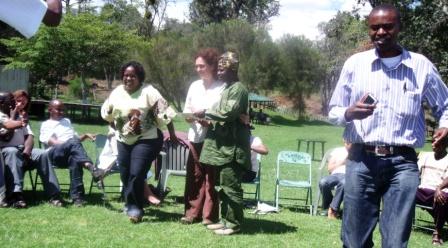AFSA Challenges African leaders on Climate Change
02/12/2009

ALLIANCE FOR FOOD SOVEREIGNTY IN AFRICA (ASFA)
Challenges African leaders on Climate Change
Bole Declaration; 25th November, 2009; Addis Ababa, Ethiopia
We, the ALLIANCE FOR FOOD SOVEREIGNTY IN AFRICA (AFSA), representing small holder farmers, pastoralists, hunter/gatherers, indigenous peoples, citizens and environmentalists from Africa, salute the strong and unified approach that African leaders have taken in the run up to the UNFCC Climate Negotiations.
However, we believe that the current African government practices do not go far enough to protecting Africa’s Food Sovereignty, Biodiversity, and the Culture and Livelihoods of her people.
Developed countries have not met their obligations to cap and reduce emissions to mitigate climate change and have not provided adequate support for adaptation in Africa and other developing nations.
Many of the so-called solutions proposed by the developed countries to address the climate crises are False Solutions. These include: biochar, agrofuels, hybrid and GM drought tolerant crops, carbon trading and so forth.
The developed countries’ positions are calculated to distract Africa from pursuing genuine solutions towards empowering communities towards attaining Food Sovereignty, conserving and sustainably using biodiversity and increasing the resilience of Africans to cope with the challenges posed by Climate Change.
We demand that African Leaders:
- Champion Small African Family Farming Systems based on agro ecological and Indigenous approaches that sustain food sovereignty and the livelihoods of communities while not neglecting other appropriate farming models;
- Protect the rights of the African people to indigenous seeds, plant and animal genetic resources and combat bio-piracy;
- Resist the Corporate Industrialization of African agriculture which will result in massive land grabs, displacement of indigenous peoples especially the pastoral communities and hunter gatherers and the destruction of their livelihoods and cultures;
- Reject the corporate takeover of African land, food production systems, indigenous knowledge and resources; and
- Bring to an end the continued exploitation of African resources for the consumerist demands of the North.
Africa will be watching her leaders at the upcoming Climate negotiations in Copenhagen in December and will hold them accountable for their engagements and decisions.
Remember that what we do now will have an impact on the current and future generations.
Signed by:
African Biodiversity Network (ABN)
African Centre for Biosafety (ACB)
Coalition for the Protection of African Genetic Heritage (COPAGEN)
Comparing and Supporting Endogenous Development (COMPAS)
Eastern and Southern African small scale Farmers’ Forum (ESAFF)
GRAIN
Indigenous Peoples of Africa Co-ordinating Committee (IPACC)
Participatory Ecological Land Use Management (PELUM) Association
PROFILE ON THE MEMBERS OF THE ALLIANCE FOR FOOD SOVEREIGNTY IN AFRICA (ASFA)
Eastern and Southern Africa small scale Farmers’ Forum (ESAFF)
ESAFF is a network of grass root farmers’ forums in 12 countries namely: Kenya, Rwanda, Burundi, Tanzania, Malawi, Zambia, South Africa, Lesotho, Madagascar, Seychelles, Zimbabwe and Botswana.
ESAFF supports the promotion of sustainable agriculture, organizational development of farmer forums, organization development, advocacy on governance, farmers’ visibility, the right to food, advocacy on land rights, campaigns against GMOS, unfavorable regional and international trade agreements and climate change.
African Centre for Biosafety (ACB)
ACB is an NGO in South Africa campaigning for food sovereignty by opposing GMOS, Bio-Piracy and agro fuels. ACB concentrates on Africa and work with several national, regional and international organizations
Indigenous peoples of Africa Coordinating Committee (IPACC)
IPACC is a network of 150 indigenous organizations in 20 African countries focusing on:
– The promotion, recognition & identity of indigenous peoples in Africa
– Enhancing participation and inclusion of indigenous people in the UN and other forums at all levels
-Building capacities of indigenous peoples’ on climate change issues
– Strengthening sub regions networking strategies for lobbying & advocacy on the rights and fundamental freedoms of indigenous peoples’.
Coalition for the Protection of African Genetic Heritage (COPAGEN)
COPAGEN comprises a membership of farmers’ organizations, trade unions, women organizations, youth groups, academics, NGOs in ten countries; Benin, Burkina Faso, the Gambia, Guinea Bissau, Guinea Conakry, Mali, Niger, Senegal, Togo, and the Ivory Coast.
COPAGEN works on the following issues: GMOs, farmers’ rights, land issues, agrofuels, agricultural policies and food sovereignty.
Participatory Ecological Land Use Management (PELUM) Association
PELUM has a membership of 207 organizations spread over ten countries namely; Botswana, Kenya, Lesotho, Malawi, Rwanda, South Africa, Tanzania, Uganda, Zambia and Zimbabwe
PELUM works on the following issues;
· Ecological land use management
· Markets and fair trade
· Access to resources
· Campaign against GMOs
· Climate change adaptation
Comparing and Supporting Endogenous Development (COMPAS) International
COMPAS Membership /Coverage is in eight countries in Africa; Ghana, Uganda, South Africa, Tanzania, Togo, Benin, Burkina Faso. COMPAS also has a membership in Latin and Central America, Asia and Europe and includes 15 universities from these countries
COMPAS is promoting an inter-cultural approach to addressing issues of climate change, food sovereignty, governance and local economic development.
African Biodiversity Network (ABN)
The ABN has a membership of 36 organizations in 12 African countries Ethiopia, Kenya, Uganda, Tanzania, Togo, Benin, Ghana, Zambia, Mozambique, South Africa, Botswana and Malawi.
ABN works on indigenous knowledge, ecosystems protection, climate change, recuperation of indigenous seeds, campaign against GMOs, agro fuels, AGRA and promotes endogenous development.






















